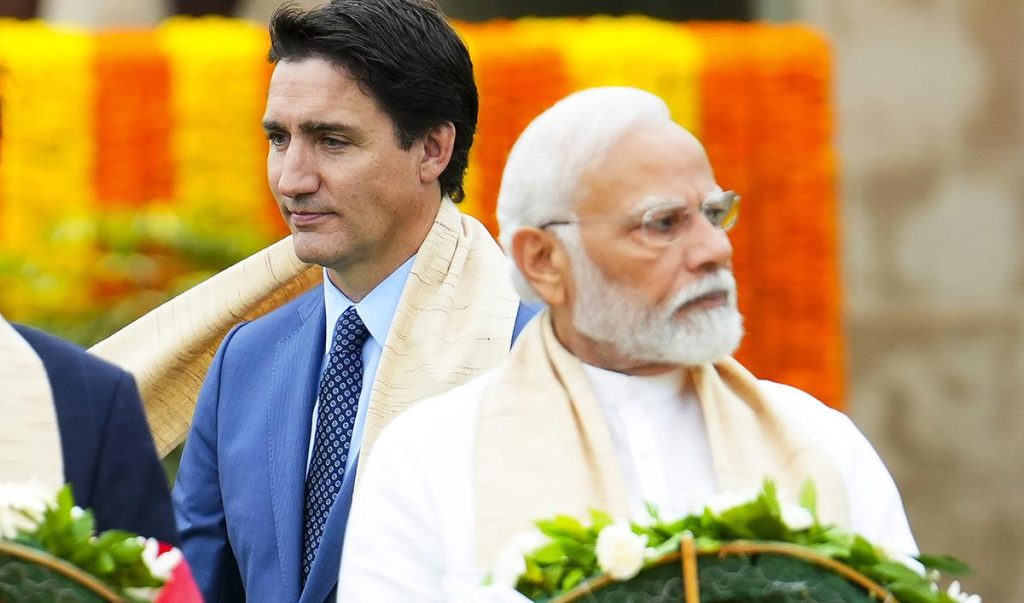
New Delhi: In a sharp rebuke, India hit out at Canadian Prime Minister Justin Trudeau
following his deposition at the Foreign Interference Commission. Responding to media
queries, India’s Ministry of External Affairs (MEA) spokesperson, Shri Randhir Jaiswal,
emphasized that Canada has failed to present any credible evidence linking Indian officials to
the 2023 killing of Khalistani separatist Hardeep Singh Nijjar, a key point of contention that
has strained relations between the two nations. “What we have heard today only confirms what we have been saying consistently all along – Canada has presented us no evidence whatsoever in support of the serious allegations it has chosen to level against India and Indian diplomats. The responsibility for the damage that this cavalier behaviour has caused to India-Canada relations lies with Prime Minister Trudeau alone,” Jaiswal stated at a press briefing.
Trudeau, who testified before the commission on Wednesday, conceded that his government
had no “evidentiary proof” but only “intelligence” regarding India’s involvement in Nijjar’s
death. This admission further fueled diplomatic tensions between the two nations, with India
maintaining its long-held stance that Trudeau's allegations were politically motivated and
unsubstantiated.
India’s Concerns Over ‘One India’ Commitment
Jaiswal also addressed Trudeau’s claim of supporting India’s territorial integrity, specifically
referencing his remarks about adhering to a ‘One India’ policy during his testimony. “We
have seen Prime Minister Trudeau’s comments about his belief in the ‘One India’ policy, but
his actions tell a different story. Anti-India elements that advocate for separatism and
disunity, threatening the very ‘One India’ concept, continue to operate freely in Canada with
no action taken against them.” The MEA spokesperson pointed out the contradiction between Trudeau words and his government inaction against those advocating for the dismemberment of India, hinting at the lack of follow-through in curbing the activities of pro-Khalistani groups in Canada.
The Diplomatic Fallout
The row between India and Canada, which began over allegations of India’s involvement in
Nijjar’s killing, has escalated in recent days. Earlier this week, the Canadian government
requested India to waive diplomatic immunity for its high commissioner and other Indian
diplomats, citing them as “persons of interest” in the investigation. In response, India
withdrew its high commissioner Sanjay Kumar Verma and five other diplomats before
Canada could officially expel them. Jaiswal reaffirmed that the decision to withdraw the diplomats was taken because of concerns over their safety. “We had informed the acting high commissioner that we had no faith the Canadian government would ensure the safety of our diplomats. Subsequently, we received communication from Canada asking them to leave, but our decision was made
independently.”
India’s Pending Extradition Requests
Highlighting India’s broader frustrations, Jaiswal revealed that New Delhi had submitted 26
extradition requests over the past decade and a half for criminals residing in Canada, many of
whom are accused of terrorism-related activities. “Despite multiple requests, no action has
been taken,” he remarked, listing individuals such as Gurjit Singh and Arshdeep Singh Gill,
members of the Lawrence Bishnoi gang, as examples of those sought by Indian authorities.
Trudeau’s Concessions on Intelligence During his deposition, Trudeau admitted that Ottawa had only intelligence from its own agencies and Five Eyes allies, rather than concrete evidence, linking Indian diplomats to Nijjar’s assassination. He further claimed that Canadian authorities attempted to engage New Delhi to address concerns but were met with a lack of cooperation.
India has repeatedly denied these allegations, dismissing them as an attempt by Trudeau’s
government to distract from domestic political issues. “This is not about evidence or justice,”
Jaiswal asserted. “This is about political posturing in Canada, at the expense of India-Canada
relations.” As the diplomatic row continues, the future of relations between the two countries remains uncertain, with both sides contemplating further retaliatory measures.
Author Profile
- India Writes Network (www.indiawrites.org) is an emerging think tank and a media-publishing company focused on international affairs & the India Story. Centre for Global India Insights is the research arm of India Writes Network. To subscribe to India and the World, write to editor@indiawrites.org. A venture of TGII Media Private Limited, a leading media, publishing and consultancy company, IWN has carved a niche for balanced and exhaustive reporting and analysis of international affairs. Eminent personalities, politicians, diplomats, authors, strategy gurus and news-makers have contributed to India Writes Network, as also “India and the World,” a magazine focused on global affairs.
Latest entries
 DiplomacyJanuary 5, 2026India walks diplomatic tightrope over US operation in Venezuela
DiplomacyJanuary 5, 2026India walks diplomatic tightrope over US operation in Venezuela India and the WorldNovember 26, 2025G20@20: Africa’s Moment – The Once and Future World Order
India and the WorldNovember 26, 2025G20@20: Africa’s Moment – The Once and Future World Order DiplomacyOctober 4, 2025UNGA Resolution 2758 Must Not Be Distorted, One-China Principle Brooks No Challenge
DiplomacyOctober 4, 2025UNGA Resolution 2758 Must Not Be Distorted, One-China Principle Brooks No Challenge India and the WorldJuly 26, 2025MPs, diplomats laud Operation Sindoor, call for national unity to combat Pakistan-sponsored terror
India and the WorldJuly 26, 2025MPs, diplomats laud Operation Sindoor, call for national unity to combat Pakistan-sponsored terror







